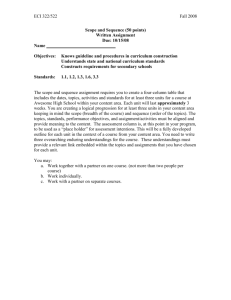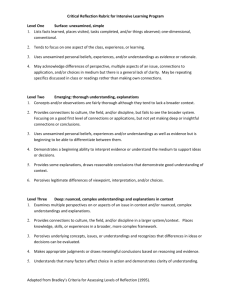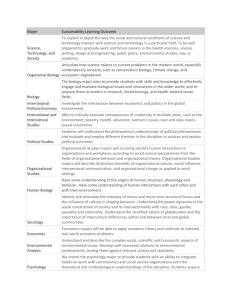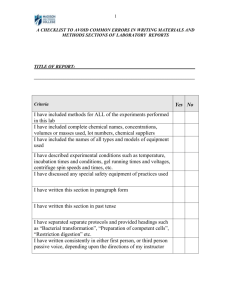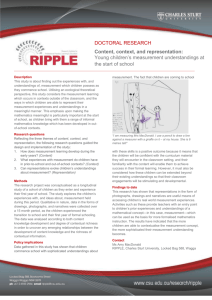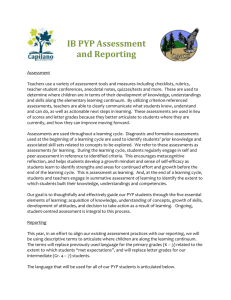Assessment Criteria for Manitoba Science Curriculum
advertisement
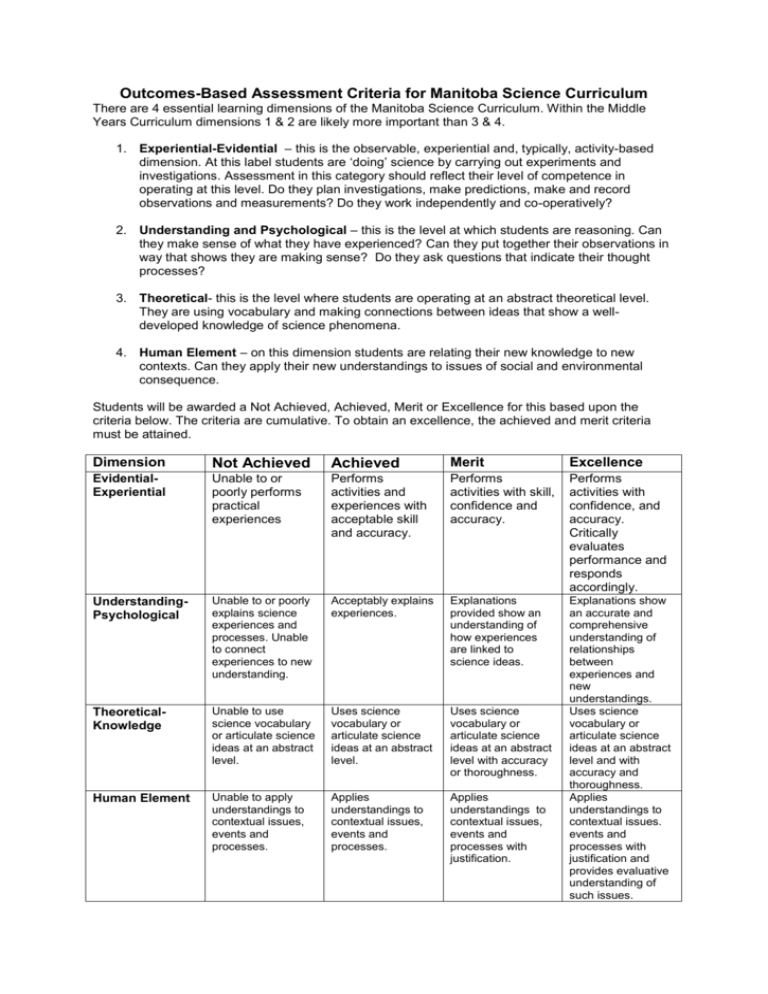
Outcomes-Based Assessment Criteria for Manitoba Science Curriculum There are 4 essential learning dimensions of the Manitoba Science Curriculum. Within the Middle Years Curriculum dimensions 1 & 2 are likely more important than 3 & 4. 1. Experiential-Evidential – this is the observable, experiential and, typically, activity-based dimension. At this label students are ‘doing’ science by carrying out experiments and investigations. Assessment in this category should reflect their level of competence in operating at this level. Do they plan investigations, make predictions, make and record observations and measurements? Do they work independently and co-operatively? 2. Understanding and Psychological – this is the level at which students are reasoning. Can they make sense of what they have experienced? Can they put together their observations in way that shows they are making sense? Do they ask questions that indicate their thought processes? 3. Theoretical- this is the level where students are operating at an abstract theoretical level. They are using vocabulary and making connections between ideas that show a welldeveloped knowledge of science phenomena. 4. Human Element – on this dimension students are relating their new knowledge to new contexts. Can they apply their new understandings to issues of social and environmental consequence. Students will be awarded a Not Achieved, Achieved, Merit or Excellence for this based upon the criteria below. The criteria are cumulative. To obtain an excellence, the achieved and merit criteria must be attained. Dimension Not Achieved Achieved Merit Excellence EvidentialExperiential Unable to or poorly performs practical experiences Performs activities and experiences with acceptable skill and accuracy. Performs activities with skill, confidence and accuracy. Performs activities with confidence, and accuracy. Critically evaluates performance and responds accordingly. UnderstandingPsychological Unable to or poorly explains science experiences and processes. Unable to connect experiences to new understanding. Acceptably explains experiences. Explanations provided show an understanding of how experiences are linked to science ideas. TheoreticalKnowledge Unable to use science vocabulary or articulate science ideas at an abstract level. Uses science vocabulary or articulate science ideas at an abstract level. Uses science vocabulary or articulate science ideas at an abstract level with accuracy or thoroughness. Human Element Unable to apply understandings to contextual issues, events and processes. Applies understandings to contextual issues, events and processes. Applies understandings to contextual issues, events and processes with justification. Explanations show an accurate and comprehensive understanding of relationships between experiences and new understandings. Uses science vocabulary or articulate science ideas at an abstract level and with accuracy and thoroughness. Applies understandings to contextual issues. events and processes with justification and provides evaluative understanding of such issues. Outcomes-Based Assessment: Example: 5-1-06: Identify the major components of the digestive system, and describe its role in the human body. Include: teeth, mouth, esophagus, stomach, and intestines break down food. It is likely that this outcome is best assessed at both the understanding (describe) and theoretical (identify) level, but the slo is more focused upon the knowledge level. Can a student identify parts and describe its role, which is both a knowledge and, to a lesser extent, understanding outcome. A variety of things could be done to assess: 1. Students could label a diagram and provide an explanation of what occurs there 2. Students could be given a series of cards. The cards might have pictures, names of parts, and what the parts do. They could sort these as matching items to show they know the relationship. 3. They could be shown a picture of the digestive system. They need to identify parts and tell you their function. Based upon this we could identify their level of achievement: Dimension Not Achieved Achieved Merit Excellence TheoreticalKnowledge Unable to use science vocabulary related to human digestion or articulate science ideas at an abstract level. Uses science vocabulary or articulate science ideas related to human digestion at an abstract level. Uses science vocabulary or articulate science ideas related to human digestion at an abstract level with accuracy or thoroughness. UnderstandingPsychological Unable to or poorly explain science experiences and processes associated with human digestion. Unable to connect experiences to new understanding. Acceptably explains experiences associated with human digestion. Explanations provided show an understanding of how experiences associated with human digestion are linked to science ideas. Uses science vocabulary or articulate science ideas at an abstract level and with accuracy and thoroughness related to human digestion. Explanations show an accurate and comprehensive understanding of relationships between experiences associated with human digestion and new understandings. Student Name Fred Level Of Achievement Merit Susan Excellence Evidence Can identify the parts and say what they do, but not in a welldeveloped manner. Identifies the parts and describes their role with detail showing she understands what role each has and how they are interconnected
